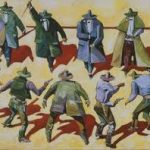
When the phone rang at 5:30 in the morning, I woke up immediately and a pall seemed to settle over me. I silently prayed, “Please don’t let it be about John,” but in my heart I knew it was. My daughter Julie was calling. She had been checking on her brother while Tom and I were in California, visiting my 90-year-old mother who was ill.
“Mom, John is on his way to the hospital and it doesn’t look good,” she said.
John had been in the hospital for three weeks with a cellulitis infection in his leg. When he was finally ready for discharge, John’s doctor felt that he would benefit from some rehabilitative work due to his prolonged bed rest, so he was sent to a rehab facility near his group home for a short stay.
My husband, Tom, was on his cell phone making reservations for me to fly back to Connecticut, when the phone rang again. “This is Dr. German, John’s physician. Your daughter asked me to call you.”
“You are one of John’s favorite doctors. He always called you Dr. German Shepherd and you would bark at him,” I recalled.
“It seems whenever I speak to you I always have bad news. John was brought by ambulance to Backus Hospital and I don’t know if he will survive. Do you want me to take extreme measures to save him?”
My mind raced back over John’s life and the times I had been told that he might not make it, but he always had. “Yes,” I replied. “Do whatever you have to do. I’ll be there this evening.”
John was the youngest of our six children, and I was concerned about him from the beginning because he just seemed too good. He rarely fussed, always seemed so happy. The pediatrician advised, “You have a contented child, so enjoy him and stop worrying.”
Two weeks later, John was in the hospital for surgery to remove a subdural hematoma that had formed between the skull and scalp and was causing pressure on the brain. He was seven months old.
For the next three and a half years, John progressed without incident. He grew into a chubby little boy, with soft brown eyes fringed with long black lashes that his sisters envied. His thick brown hair covered the scar from the surgery quite well. Even though he tested above average in abilities for his age group, I still worried. If he fell, he didn’t cry. He walked off the top step of our porch—a fall of two feet—and not even a whimper.
Then he started having trouble getting around the house, walking into things, spilling his drinks. His kindergarten teacher reported similar incidences at school. After a battery of tests, we were told that John had a benign but very large brain tumor generating from the optic nerve, close to the brain stem. It needed to be removed through surgery the following week. We were also told that John would probably be blind.
A few weeks after the surgery, John, who had gone next door to play with his friend, Sarah, came stomping in and announced, “I’m not playing with Sarah anymore.”
“How come? “I asked.
“She said I’m blind.”
I was stunned. “But, John, you are blind,” I replied.
He stopped, turned to me and said, “I am? Well, what does it mean to be blind?”
“It means you can’t see.”
“I can see,” he told me indignantly.
“But you see differently than most people. Tell me how you see.”
“I feel things,” he told me. “And I’m really mad at my sister Laurie. She brought a new friend home yesterday and she wouldn’t let me feel her.”
Stifling a laugh, I said, “Well, John, 16-year-old girls don’t always like to be felt.”
I thought about John walking out every day of his life into total darkness, never knowing exactly what surrounded him, yet each day he did this without concern. He walked to friends’ homes, visited Mr. Anderson, an elderly gentleman who was bedridden, and made trips to the neighborhood store. He made these trips long before he had instructions from a mobility expert. At this point he didn’t even have a cane. The expert was shocked that John knew how to walk safely through the neighborhood. When asked, John replied, “How else would I do it? I have to keep my foot next to the grass so I can tell where the driveways start. I count the driveways so I know when I get to my friend’s house.”
When John was nine years old, he again started exhibiting unusual symptoms, being lethargic and falling asleep in school. The tumor had grown back. We were told he probably had a year to live. He survived another 28 years, through sheer determination and his love of life.
John was such a special boy, with such a special way of making his way through a dark life. His siblings cut him no slack. They treated him like a sighted person and he was a better person for it. He learned to make his bed, fold his cloths, make sandwiches, and dial a telephone.
His sister Julie even tried teaching him how to drive. Not really. She was just going to pretend to let him drive. In the family station wagon, Julie gave John the keys and told him how to turn on the ignition, unaware that their Dad had taught John how to shift gears. John put it in drive and away they went, through our fence and into the back yard! John thought it was great fun.
He may have been blind and handicapped, but he saw, felt, and understood more than I ever had, so I wonder which one of us was really the handicapped person.
I was jolted from my reverie by the captain’s announcement of our arrival at Bradley Airport. I had no idea what heartache awaited me.
Each day at his bedside, my special child, unresponsive except for a slight squeeze of my hand, we hoped for a miracle, but none came. There was indication of long-term vegetative state. A decision had to be made, but how could I do it? I prayed for guidance. That evening in the visitors’ lounge, a nurse was talking to my five-year-old grandson, Bret. She told him his uncle was going to be an angel soon. Bret looked up at her and in a quiet voice said, “My uncle has always been an angel.” There was my sign.
My son-in-law Bruce said, “It may not be my place to say, but you know how much John liked to share. Don’t you think he would want to help as many people as he could with his organs?”
He was right of course. We met with the organ donor team and made the arrangements. The respirator was removed. In less than an hour the doctor came into the room and said, “I don’t know how to tell you this but we had to send John back upstairs. We can’t harvest the organs. His heart stopped beating in 45 seconds and we were ready to begin, but the moment I pricked his skin with my scalpel, John’s heart started beating again. I have never had this happen before.”
We were all in shock. Then my son Carl said, “Wait! Don’t you remember his big plans he always talked about? He always said, ‘When I die and go to heaven and get my eyesight back, I’ll come back here, buy a van, and take you all for a ride.’ Don’t you get it? He needs all his body parts for his big comeback.”
John’s body left us, but not his spirit. So many wonderful memories of a baby, a special boy, an even greater young man, who lives in our hearts and also in the hearts of so many people he touched.
For more information about Lake Chapala visit: www.chapala.com

CONTACT US
- A Special Boy - August 31, 2022






